

|
| weblog/wEssays archives | home | |
|
Denial, Fragility and a Schizophrenic Culture (July 10, 2007) I invite you to compare the picture of American prosperity as presented by the Federal government's (phony) statistics (incredibly low unemployment and inflation, rising wages and wealth, astonishing prosperity all around) and its chief shills, Ben Bernanke and Hank Paulson, and reality as captured by the following charts. 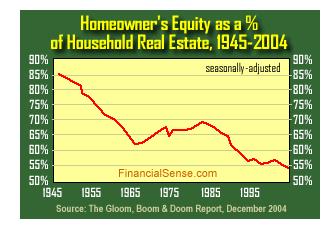 Consider this graph of homeowner equity. How can homeowner equity be plummeting in the
greatest real estate boom in recorded history, when tens of millions of properties have doubled
or tripled in value?
Consider this graph of homeowner equity. How can homeowner equity be plummeting in the
greatest real estate boom in recorded history, when tens of millions of properties have doubled
or tripled in value?
Gee, could it be that Americans have pulled money out of their houses even faster than they've risen in value? This is undeniably the case. As the following charts show, Americans have borrowed money /extracted equity at such a furious rate that it's not home equity which is rising but household debt. And what have people done with this borrowed money? Have they squirreled it away for their retirement? If so, there is scant evidence of it; this chart suggests that they've spent the vast majority of it on consumer goods and services. 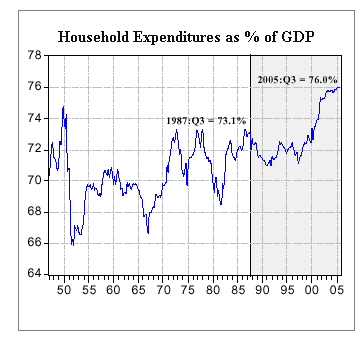 The proof of this free spending is everywhere: massively crowded airports because everyone is
jetting everywhere, weak dollar be damned, fancy restaurants crammed to the gills, and of
course huge shiny new SUVs and pickup trucks towing behemoth boats.
The proof of this free spending is everywhere: massively crowded airports because everyone is
jetting everywhere, weak dollar be damned, fancy restaurants crammed to the gills, and of
course huge shiny new SUVs and pickup trucks towing behemoth boats.
I look at these new vehicles--nary a one with a tool box or other evidence of a working truck--and wonder: who can afford this? Not just the monthly payment, but the insurance and gas. I know some people who make enough to own them, people making $100,000+ per year--but they're too exhausted to be driving around on Saturday towing their boat. Heck, they're at work or doing laundry or just sleeping, trying to rest up for Monday. So who are these people flying to Europe, driving brand-new $30,000+ trucks and blowing $200 for dinner? Yes, they're middle-class Americans--the ones with negative savings, tapped-out equity and medicine cabinets full of medications. 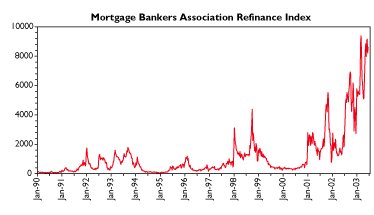 As we ponder the meaning of that enormous spike in re-financings--sure, people re-financed to
get lower interest rates, but how many took out some cash at the same time?--let's consider
another trend which we can see with our own eyes: a culture of individual
identity based solely on the external markers of fame, prestige and wealth.
As we ponder the meaning of that enormous spike in re-financings--sure, people re-financed to
get lower interest rates, but how many took out some cash at the same time?--let's consider
another trend which we can see with our own eyes: a culture of individual
identity based solely on the external markers of fame, prestige and wealth.
If you've been on the planet a few decades, you know Americans have always been obsessed with celebrity and wealth. But never before were typical Americans so desperate for a fleeting moment in front of the camera themselves. There were no "reality" shows decades ago, no people groveling through disgusting indignities for their sweet glorious seconds of fame, or airing their dirtiest laundry in order to be lectured by some smarmy "celebrity" therapist or judge. 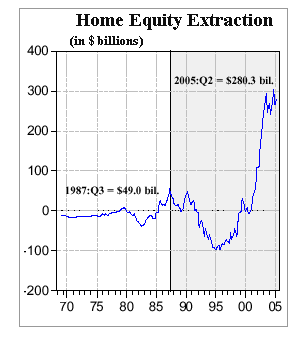 Hey, young ladies, take your shirt off! You'll be "famous" for a few seconds somewhere. Or
leave your dorm room cam on while you undress. You might even get hundreds of subscribers if
you convince your pals to join you prancing around in your panties.
Hey, young ladies, take your shirt off! You'll be "famous" for a few seconds somewhere. Or
leave your dorm room cam on while you undress. You might even get hundreds of subscribers if
you convince your pals to join you prancing around in your panties.
Guys, you can't "earn your moment of celebrity" quite so easily; you'll have to eat slugs and get muddy, and suffer humiliations no secure individual would even tolerate, much less volunteer for. I don't mean to suggest there's anything wrong with going to Hollywood to be a movie star or getting your pals together and forming a band; if you can make it on talent and perseverence, good on ya. And yes, this is the promise of "American Idol." But if we look a little deeper at "Idol," we realize what it really offers is a short-cut to fame without all those boring years of gigging and writing compelling material: just stand up, sing your little cover song, and voila, a recording contract and instant fame. Heady stuff, indeed. Hmm, if times are so darn good, why are personal savings plummeting and debt skyrocketing? Does everyone borrow more when their wealth is supposedly rising like a balloon? (Some charts are a bit outdated but the trend remains unchanged.) 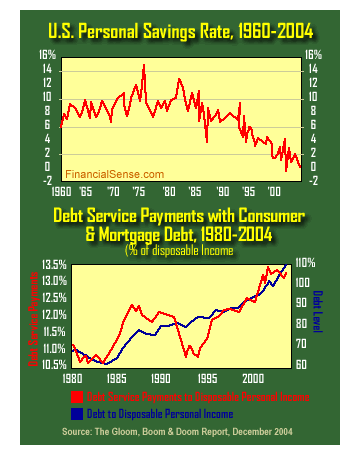 And speaking of heady stuff, let's consider why so many Americans are on drugs. On the face
of it, shouldn't such prosperous people be happy and secure? If you step back, you have to
wonder: why are tens of millions of Americans taking anti-depressants and anti-anxiety medications,
and tens of millions more addicted to cocaine, heroin, marijuana, alcohol and nicotine?
And speaking of heady stuff, let's consider why so many Americans are on drugs. On the face
of it, shouldn't such prosperous people be happy and secure? If you step back, you have to
wonder: why are tens of millions of Americans taking anti-depressants and anti-anxiety medications,
and tens of millions more addicted to cocaine, heroin, marijuana, alcohol and nicotine?
Like everything else in our Potemkin Village society, it's all just beneath the surface. People don't like to admit that they're not Superman or Superwoman, so it's only your close friends who will tell you. But check out who's a pothead, who's on anti-depressants, and whose underage kids are drunk--ho-hum, just another normal day in sedated, medicated, drugged America. You think I'm exaggerating? Then ask your friend who's gone through an addiction or drug rehab program (yes, it may surprise you who you know who has), and ask them about the nurses who are coke-heads, or the software engineers on smack, or the folks who have to have OxyContin, that favorite "relaxer" of right-wing radio demogogues. If you're in law enforcement--well, I'm not telling you anything new. You've seen even worse, the guys doped up on ice (crystal meth), and boy, are they a piece of work. I'm not questioning the value of anti-anxiety and anti-depressants--I know from the experience of those close to me that they can make a critical, positive difference in the lives of those suffering from psychiatric disorders. What I am questioning is the high levels of reliance on powerful medications/drugs, prescribed and otherwise, by what seems like an extraordinary number of Americans. Perhaps all humans are unhappy and stressed-out-- but doesn't the culture they inhabit have some influence? 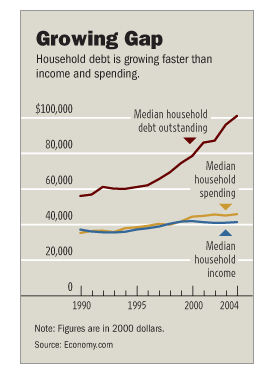 Put yourselves in the shoes of a visiting anthroplogist and look at our society at face value.
Yes, all humans like to get happy--beer was invented in Egypt a long time ago, and hey, the
residents of Middle Ages Europe had to drink beer because drinking the water would kill you. Yes, the
records of cathedral construction crews shows that the guys' portions of ale were spaced out
through the day so they wouldn't get too inebriated to work.
Put yourselves in the shoes of a visiting anthroplogist and look at our society at face value.
Yes, all humans like to get happy--beer was invented in Egypt a long time ago, and hey, the
residents of Middle Ages Europe had to drink beer because drinking the water would kill you. Yes, the
records of cathedral construction crews shows that the guys' portions of ale were spaced out
through the day so they wouldn't get too inebriated to work.
(The Chinese discovered that boiling water for tea was another pathway to safe hydration, and I think that may have been part of why they were so far ahead of the Europeans in the Tang Dynasty 700-900 A.D.) But our objective anthropologist notes that the water is safe to drink in the U.S., and people aren't just having a social drink to relax with friends or after work--they're bombed, doped, medicated, blitzed, day after day, apparently just to survive. What does this say about their culture and society? That it's "normal" and "healthy"? No objective observer could possibly conclude that unless they were in massive denial (and smashed to boot). No, you have to conclude that this is a society under extreme duress, a culture in which individuals are feeling tremendous stress as a result of the double-bind they live in: you are only worthy if you go to a prestigious university, make tons of money, drive a luxury vehicle, are famous /recognized as wonderful somewhere, are slim, athletic, good-looking, talented, and a perfect parent with perfect kids--and yet most of us are average-looking, with average intelligence and drive (I raise my hand here) and average everything else, too (my hand is still up). Because we live in a college town (okay, a prestigious university town), we do know super-acheivers. For example: graduated from super-selective law school a semester early, was flown to London all expenses paid for a job interview, was hired at a starting salary of $150,000 or so and moved to London. Good on ya, girl! But is this individual happy? We hope so, but if she is, it's not because of her apparently perfect career--it's because she found a job which matches her character and interests. The number of unhappy attorneys is legion. (Oh, and California has the nation's only 3-day long Bar exam. Good luck on that, because they only allow 50% of the exhausted students to pass. The test gets harder and harder every year to raise the bar--pun intended.) Does anyone else see a disconnect between the frenzied drive to attend a private college which costs $40,000+ a year and the fact that tech heroes Bill Gates and Steve Jobs did not finish college? This smacks of a culture so fearful of failure and worthlessness that every ounce of "prestige" must be scrounged like the last scrap of bread in a famine. Yes, it's important to go to college or acquire a trade/skill--I am only questioning why so many people choose a lifetime of debt in order to go to a private school when a perfectly good public university is probably close at hand. (And if you work your way through, your grades will suffer, but with some roommates and a cheap lifestyle you'll get your degree with a modest loan or maybe even no debt rather than a mountain of debt.) Is this a culture of secure individuals who don't need external props for their identity and sense of self, who have the confidence to make their own lives and livelihoods without a bunch of paperwork or gew-gaws proving they're Superman or Superwoman? No, it is not. It is a society of adrift, fearful, insecure, stressed-out, unhappy, fragile, vulnerable people seeking external props and cures for what can only come from within. One of our correspondents (sorry, I can't recall which one, my apologies) recently recommended Maxed Out: Hard Times, Easy Credit and the Era of Predatory Lenders. Along the same lines, there's a new book titled The Trap: Selling Out to Stay Afloat in Winner-Take-All America As an example of insecure consumers caving in to the commercialization of identity, there's One Perfect Day: The Selling of the American Wedding And as an example of how community identity is also enslaved to the "prestige of a major league sports team," there's Field of Schemes: How the Great Stadium Swindle Turns Public Money into Private Profit Bottom line: in an era of supposedly unparalleled, widespread prosperity and wealth creation, the financial and inner reserves of many Americans appears vulnerably thin. Somebody profited from originating all this debt, but nobody forced anyone at gunpoint to borrow it, either. The dis-ease lies deeper than predatory lenders; they are the pushers, but who's the customer? And why? For more on this subject and a wide array of other topics, please visit my weblog. copyright © 2007 Charles Hugh Smith. All rights reserved in all media. I would be honored if you linked this wEssay to your site, or printed a copy for your own use. |
||
| weblog/wEssays | home |